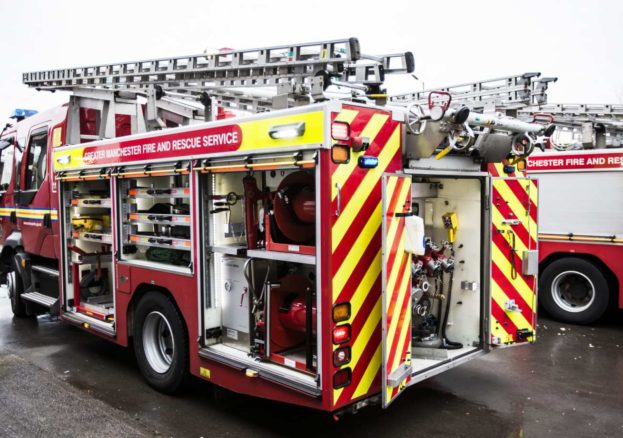
GMFRS has pledged to create an inclusive culture where people can bring their whole self to work. Inclusion is central to our organisation’s way of working, embedded in all behaviours, cultures and practices.
We place a firm emphasis on fire prevention, and our fire fighters spend a great deal of time promoting fire safety within the community. To support in this and the people we serve, we are working towards a truly diverse workforce that reflects all our communities. We value, respect and embrace difference, and are enabling everyone to recognise the benefits that equality, diversity and inclusion bring to our Service. GMFRS aspires to be an employer of choice for people, and improving safety across all our communities.
A core part of being a Firefighter is responding to emergencies and saving lives. As well as fighting fires, Firefighters attend other emergencies such as road, rail and air traffic accidents, chemical spills, floods, and terror attacks.
Through our free Safe and Well checks, Firefighters visit homes, assess their risk from fire, check smoke alarms, and advise people on how best to plan their escape routes in case of fire, all to support in the key focus of fire prevention.
Firefighters carry out building inspections to make sure that local businesses are complying with fire safety regulations. They also work closely with other public services and community organisations to promote important fire and water safety advice.
After you’ve completed your two-year apprenticeship, you’ll become a fully qualified Firefighter. At GMFRS, there are lots of opportunities for career progression and to develop your skills. If you choose to remain working on the fire engines, you can apply for a promotion to become a Crew Manager and then a Watch Manager. Or you can apply for a range of specialist roles within the Service:
Roles
Crew Manager
Becoming a Crew Manager is the first step into a line-management role. Crew Managers support Watch Managers in the day-to-day supervision the team, helping to deliver community-based activities, as well as ensuring GMFRS is a safe and effective service. Crew Managers lead teams in emergency situations and provide direction at operational incidents.
Watch Manager
The next step into management is becoming a Watch Manager. As well as ensuring the team is safe, effective and delivering day-to-day activities that meet wider organisational objectives, Watch Managers provide leadership and direction to maintain standards and improve how GMFRS delivers to the diverse communities it serves. At larger incidents, Watch Managers lead teams within functional sectors to successfully coordinate and resolve operational response.
Corporate Trainer
Corporate trainers deliver practical and theoretical elements of the recruits course to ensure new recruits are safe to start their career as Apprentice Firefighters. They also deliver training to operational crews, both refresher training and new skills. This includes breathing apparatus, road traffic collision, incident command and much more.
Fire Safety Officer
Fire Safety Officers keep people and buildings safe from fire. They audit buildings and provide advice to owners or tenants on how to keep safe. This includes looking at fire alarms, means of escape, occupancy and more. Fire Safety Officers also take part in licence and building regulation consultations.
Fire Investigation Officer
The Fire Investigation team investigate the cause of a fire and give evidence in court. They feed the results of their investigations into fire safety and Firefighter training. They also use fire dogs to help identify sources of fire and accelerants.
Operational Support Officer
Operational Support Officers research, test and trial all equipment and technology used by our operational crews, from fire engines to gloves. They arrange trials to test safety and efficiency then write detailed reports on their findings. This work can take them all over the country and even abroad if needed.
Contingency Planning Officer
The Contingency Planning team work with event organisers to ensure that large public events are safe for those that attend. Officers assist with safety control measures and prepare plans how to deal with incidents at large events, such as Christmas markets, football matches or large music events.
Hazmat Officer
Hazardous Materials Officers assist all emergency services with incidents involving chemicals that may be in the form of powders, solids, liquids or gases. They use specialist equipment to detect, identify and monitor chemicals at incidents. They advise on how to resolve incidents safely to prevent damage to life and the environment.
Drone Operator
Drone Operators assist crews at incidents to get an overall picture of an incident using overhead images and use thermal imaging cameras to identify hotspots. Drones are used at large building fires, moorland fires, water incidents and to help locate missing people.
Senior Management
Senior Managers are responsible for the efficient running of GMFRS. They also provide strategic advice and support to resolve operational incidents and to implement an Integrated Risk Management Plan and Fire Plan.
